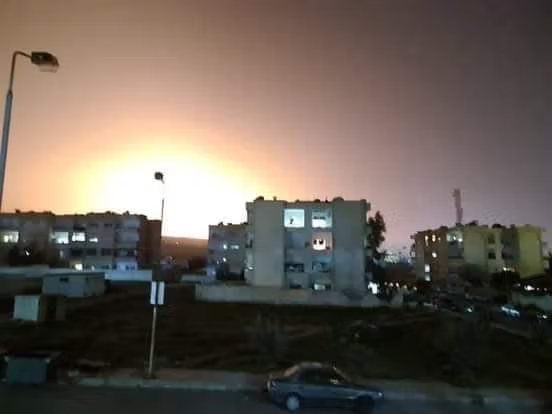Israel Shells Hezbollah Position In Syria Amid Fears Of Multi-Front War

Israel reportedly shelled the positions of Iran-backed Hezbollah near its northern borders with Syria in Al-Quneitra province, near the Golan Heights.

Israel reportedly shelled the positions of Iran-backed Hezbollah near its northern borders with Syria in Al-Quneitra province, near the Golan Heights.
More than 20 shells were fired Monday morning at a position controlled by the Lebanese Hezbollah, which has established many similar bases near the Israeli border.
So far, there is no official word from the Syrian or Israeli governments about the attack, that came barely three weeks after extensive terror and rocket attacks by Iran-backed Palestinian groups against Israel.
Times of Israel reported that artillery strike was reported by Sham FM, a Syrian radio station affiliated with the regime of Syrian President Bashar Assad.
Israel also reportedly dropped leaflets warning Syrian troops not to cooperate with Iranian militia and allow them to operate near its borders. Names and photos of Syrian army officers allowing these militias to operate in the area were printed on the leaflets.
“We are closely watching and aware of the ongoing intelligence cooperation with Hezbollah within the Syrian army’s positions in the region, including near the Israeli border. Your cooperation with Hezbollah has… brought you more harm than benefit. Cooperation with Hezbollah leads to harm!” the flyer read.
The Syrian Observatory for Human Rights, a London-based war monitor also reported the Israeli attack, saying that a similar artillery strike took place on April 17.
There are still no reports about possible casualties.
Iranian officials have boasted of having destabilized Israel by the early-April rocket attacks by the Palestinians and with a new vigor has vowed to help militant forces to continue the campaign, saying that Israel has become weaker and will succumb to the “resistance,” a term used to refer to Tehran’s proxies.
Concerns have been growing in Israel over a possible multi-front war, with attacks coming from Gaza, Lebanon and Syria. Army intelligence has warned of the danger, but Iran International's correspondent in Israel reported that the chairman of Israel's national security council Tzachi Hanegbi disagrees with the assessment for the near future.
Israel has been extensively conducting air and missile strikes against Iran’s military presence across Syria at least since April 2017. Thousands of attacks have targeted weapons depots, and other military positions controlled by Iran’s Revolutionary Guard.
Iran ships large quantities of arms to Syria and maintains up to 30,000 Afghan, Pakistani and Iraqi militiamen in addition to Hezbollah fighters to turn Syria to a new front against Israel.
Israel has not taken responsibility for the great majority of these attacks but has vowed never to allow Iran to get entrenched in Syria.
Iranian officials have intensified their anti-Israeli rhetoric since the military confrontation earlier this month, with claims of victory and threats of annihilating Israel coming on daily basis.
Iranian media reported Monday that Foreign Minister Hossein Amir-Abdollahian spoke with Hamas leader Ismail Haniyeh by phone, reiterating Tehran's "spiritual and political support" for Palestinians. Haniyeh reiterated "the serious will of Palestinian groups" to continue "the resistance".
The Hamas leader also welcomes a Saudi Iranian agreement in March to restore diplomatic relations.